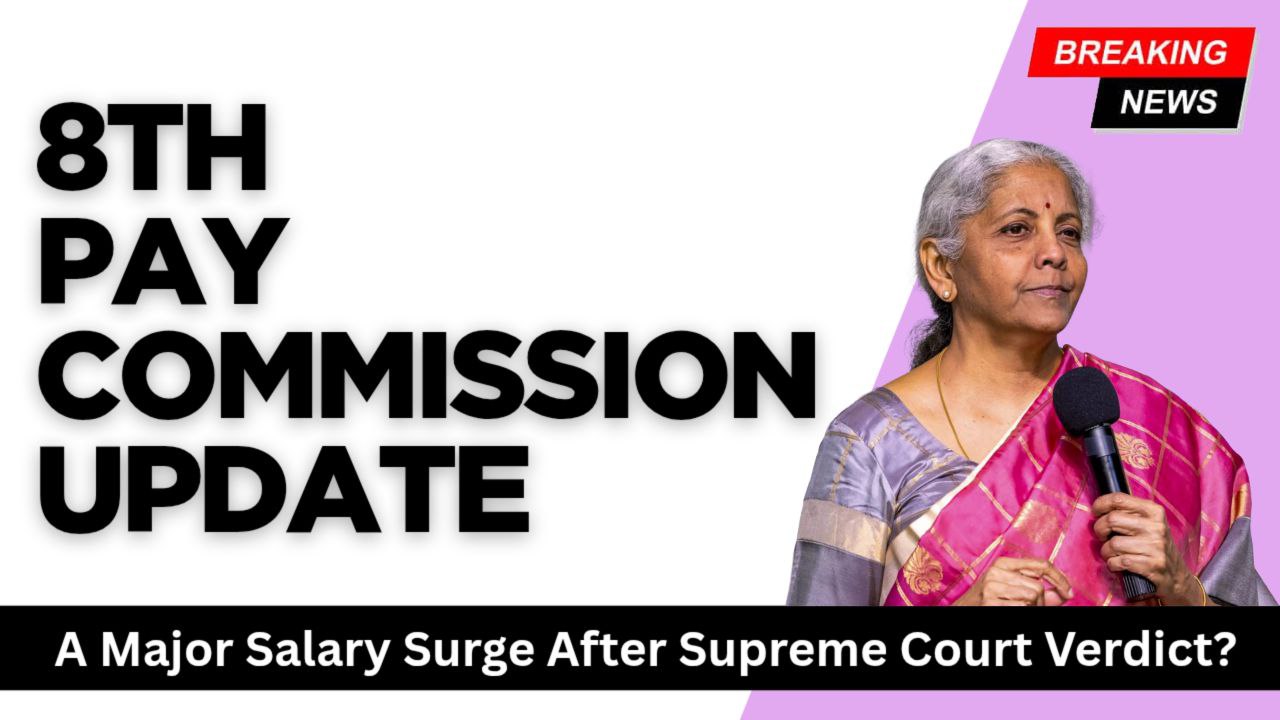8th Pay Commission Update: A Major Salary Surge After Supreme Court Verdict?: The buzz around the upcoming 8th Central Pay Commission (CPC) has intensified after a recent Supreme Court observation on employee salary revisions. Millions of government employees and pensioners across India are closely following the developments, as expectations of a substantial pay hike have reignited hope after years of stagnation under the 7th Pay Commission framework. This article provides a detailed overview of what’s happening, what the court said, and what it could mean for the future of government salaries in India.
Background: From 7th Pay Commission to the 8th Pay Commission Update
The 7th Pay Commission, implemented in 2016, brought structural reforms to government salaries and pensions. It introduced a fitment factor of 2.57, meaning employees’ basic pay was multiplied by that factor to arrive at the revised salary. While the change benefited employees initially, the rate of inflation and rising cost of living have eroded much of the real income gains over the years.
Now, with almost a decade since the 7th CPC, discussions have begun around the 8th Pay Commission, which is expected to come into effect from January 2026. However, recent developments especially a Supreme Court remark on pay parity and regular revision have accelerated speculation that changes may come sooner than expected.
Supreme Court’s Recent Observation: What Sparked the Debate?
In a recent case concerning public sector employee salary parity, the Supreme Court emphasized that fair compensation is a constitutional right. The Court observed that government employees should not suffer from pay stagnation and that pay revisions should reflect changes in economic conditions and inflation trends.
While the verdict was not directly about the 8th Pay Commission, it highlighted the responsibility of the government to ensure that employees receive equitable pay in line with market realities. This statement has triggered widespread discussion among employee unions, economists, and policy analysts many of whom see it as a green signal for early action on the 8th CPC.
Employee and Pensioner Expectations: 8th Pay Commission Update
As of 2025, India has over 48 lakh central government employees and 68 lakh pensioners, all of whom will be impacted by the decisions of the next Pay Commission. Their major demands include:
- Increased Fitment Factor: From 2.57 to 3.68 or higher, to compensate for inflation.
- Revised HRA and DA structure: To better align with the cost of living in different cities.
- Automatic pay revision mechanism: Instead of waiting 10 years for a new commission.
- Improved pension indexation: Especially for retired employees in lower pay bands.
- Restoration of old pension scheme (OPS): A demand strongly voiced by several unions.
What the Government Has Said So Far: 8th Pay Commission Update
- The central government has not yet officially announced the formation of the 8th Pay Commission, but various sources indicate preliminary consultations are underway within the Ministry of Finance.
- Officials have hinted that the government might explore “Performance-Linked Pay Revisions”, rather than a one-size-fits-all increase. This model would consider employee productivity, department performance, and inflation rates when determining salary hikes.
- However, many experts argue that such a model could complicate implementation and potentially lead to bureaucratic disputes over evaluation fairness.
The Role of Dearness Allowance (DA) in the Interim
Until the new pay commission takes effect, Dearness Allowance (DA) remains the primary tool for inflation adjustment. As of mid-2025, DA has risen to 46%, and a further hike is expected in January 2026, pushing it closer to 50%. Once the DA crosses 50%, allowances like HRA and TA are usually revised upwards, automatically boosting in-hand salary.
Many analysts believe that if DA touches 50% before 2026, the government may use that as a trigger point to implement the 8th CPC recommendations earlier than planned.
Potential Salary Hike Under the 8th Pay Commission: 8th Pay Commission Update
While official figures are yet to be announced, preliminary estimates based on past revisions suggest:
| Pay Commission | Implementation Year | Fitment Factor | Average Salary Hike |
|---|---|---|---|
| 6th CPC | 2006 | 1.86 | 54% |
| 7th CPC | 2016 | 2.57 | 23.55% |
| 8th CPC (Expected) | 2026 | 3.68 (proposed) | 30–35% (estimated) |
If the fitment factor is revised to 3.68, the minimum basic pay could rise from ₹18,000 to around ₹26,500–₹27,000 per month. This change would ripple across all salary bands, leading to an overall 30–35% increase in gross pay for most employees.
Economic Implications of a Major Salary Hike: 8th Pay Commission Update
- While a pay commission revision benefits employees, it also imposes a significant fiscal burden on the government. Experts estimate that implementing the 8th CPC could cost the exchequer ₹1.5 to ₹2 lakh crore annually.
- However, economists argue that the benefits such as increased consumer spending, economic stimulus, and tax revenue growth can partly offset the fiscal impact. A balanced approach, with gradual rollout or sector-wise implementation, may be adopted to manage budgetary pressure.
What Could Change in the New Pay Matrix: 8th Pay Commission Update
The 8th Pay Commission is expected to bring several structural upgrades:
- Revised Pay Matrix with broader pay bands and fewer stagnation points.
- Digital indexation system for DA and annual increments.
- Better parity between central and state employees, possibly through a standardized ratio.
- Focus on skill-based and performance-linked increments, encouraging productivity.
These reforms could make government jobs more competitive and attract talent from the private sector as well.
Pension Reforms and Senior Citizen Relief: 8th Pay Commission Update
Pensioners have also been vocal about their concerns. Many demand full parity with serving employees, along with improved Dearness Relief (DR) and medical allowances.
The Supreme Court’s observation has strengthened their case, emphasizing that pensioners deserve regular revisions and fair compensation. The government may introduce a revised pension formula under the 8th CPC, linking it directly to the new pay matrix.
Employee Union Pressure and Public Sentiment: 8th Pay Commission Update
Employee unions like the National Joint Council of Action (NJCA) and Confederation of Central Government Employees and Workers have intensified their lobbying. They have urged the government to announce the 8th Pay Commission by early 2025, arguing that inflation and rising living costs have outpaced salary growth.
The growing public sentiment among middle-class households especially those dependent on fixed government salaries further amplifies this demand. With general elections approaching in 2026, political analysts believe that an early announcement of the 8th CPC could have significant electoral impact.
Challenges Ahead for the Government: 8th Pay Commission Update
Despite mounting pressure, the government faces several challenges:
- Balancing fiscal responsibility with employee expectations.
- Avoiding inflationary pressure that could follow large salary hikes.
- Ensuring fair distribution between different pay levels and departments.
- Coordinating with state governments, many of which mirror central pay scales.
Experts suggest a phased implementation, possibly starting with lower-level employees and pensioners, followed by officers and higher grades.
Department of Expenditure (Official Pay Commission Page): Click Here
Press Information Bureau (PIB) – Official Government Announcements: Click Here
Conclusion: 8th Pay Commission Update
The 8th Pay Commission represents more than just a salary revision it’s a critical moment in India’s public sector reform story. The Supreme Court’s recent remarks have given moral weight to the idea that government employees deserve timely and fair pay adjustments, especially amid rising inflation. While official confirmation is still awaited, momentum is clearly building. Whether the commission is announced in late 2025 or early 2026, it is expected to bring a major salary surge and potentially redefine how government pay is structured in the coming decade.
For now, government employees and pensioners can look forward with cautious optimism hoping that the 8th Pay Commission will not only increase salaries, but also restore the value of public service in India’s fast-changing economy.
Read Also: Bank of Baroda Mudra Loan 2025: Get ₹50,000 to ₹5 Lakh in Just Minutes

